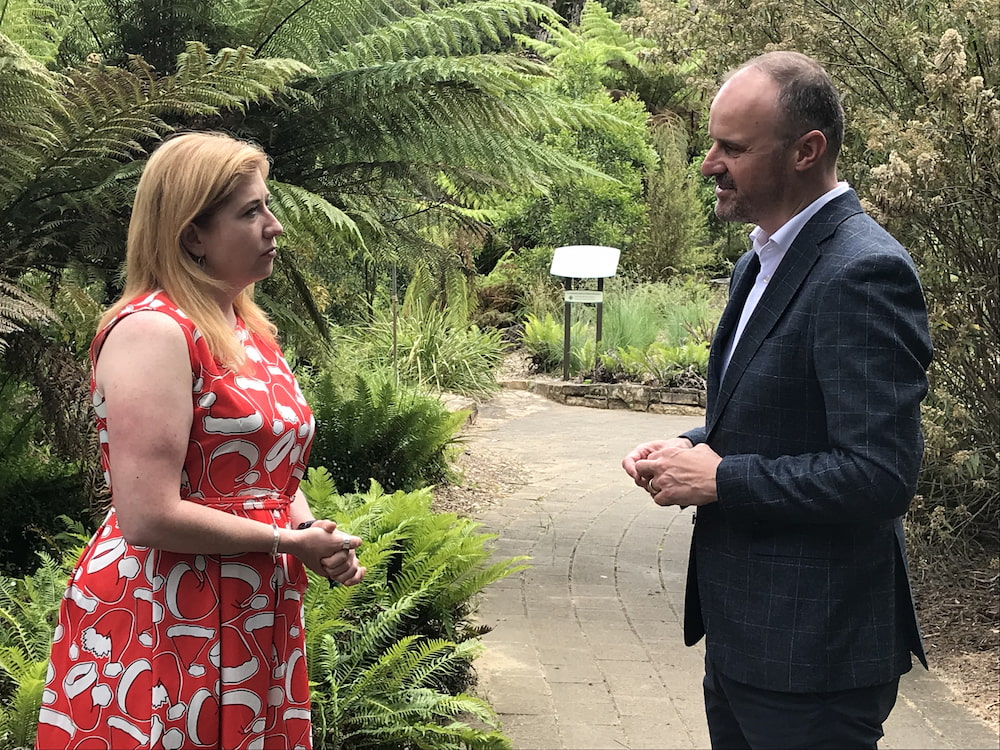Voluntary assisted dying will be one of the biggest issues for the ACT Legislative next year, Chief Minister Andrew Barr told Canberra Daily earlier this week. Last night, the Senate voted to end the ban on the ACT and the Northern Territory debating euthanasia, in place since 1997. Now, the ACT government begins the task of discussing, debating, and legislating.
“We’re going to have voluntary assisted dying laws; the question is the exact nature of them,” Mr Barr said.
How and what assisted dying looks like in the ACT will be co-designed with the community, Tara Cheyne, ACT Minister for Human Rights, said.
Over the summer, the government will refine a discussion paper, ready for February, when the Legislative Assembly year begins. The consultation will take at least eight weeks.
The initial consultation will help parliamentary drafters put policy objectives into legislation, Mr Barr said. It will consider such questions as eligibility criteria, safeguards, and residency requirements.
Ms Cheyne wants everyone in the community to be able to have their say. The government will go out to where the people are, ask them questions, host roundtables with different communities, and invite submissions.
Ms Cheyne will lead the work, with the assistance of Mr Barr, health minister Rachel Stephen-Smith, and Attorney-General Shane Rattenbury.
It will take most, if not all, of 2023 to draft the voluntary assisted dying laws, Mr Barr said; he expects to get it done before the next election in 2024.
After the consultation process ends, the ACT Government will prepare and release a listening report on the feedback provided during the consultation.
Mr Barr and Ms Cheyne plan to introduce a Voluntary Assisted Dying Bill to the ACT Legislative Assembly in the second half of 2023. They anticipate that a parliamentary committee would review the legislation over three months or more.
Elizabeth Lee, leader of the Canberra Liberals, said she welcomed the passage of the “historic” territory rights bill – she has had many discussions and urged federal members of parliament to restore territory rights in the ACT.
But her party would scrutinise both the consultation process and the bill closely, Ms Lee said. It was important to take the process slowly and deliberatively, she said.
“What we don’t want to see is anything that’s too rushed. What we don’t want to see is any member of the community feeling like they can’t have their say. We want to make sure that the diverse views on this issue very well respected and heard and listened to.”
All six states have already passed legislation permitting euthanasia. That means there are six examples around the country the ACT can draw upon, Mr Barr said. Queensland may be the best model for the ACT: its Labor government led the initiative, resulting in a law that reflected the community’s values, Ms Cheyne said.
He and Mr Rattenbury want the ACT to have some of the most progressive laws in the country. That entails early and significant engagement with the community around the issue, and the legislation effectively translating into an operable scheme, Mr Barr said.
One issue is that assisted dying can be difficult to access, Mr Barr said. There need to be safeguards, he explained, but the safeguards cannot be so stringent that no-one gets the benefit of the scheme.
“That’s the balance we need to strike,” he said.
Ms Lee also wants safeguards for under-18s (some countries, like Belgium and the Netherlands, euthanise minors) and for people with mental impairment.
“When I say that I support voluntary assisted dying, what I mean by that is I support the notion that every single person should determine the way that they wish to end their life, free from undue influence,” Ms Lee said.
“That is not a blank check. That is definitely not a blank check, and that is why we will be making sure we keep a very close eye on the safeguards, on the model that is being proposed. We want to make sure that in saying they want the most advanced process that the Chief Minister and the leader of the Greens do not take it too far. And what they mean by that is that it is going to be the most lax process. That is not what we are looking for. What we’re looking for is the best model. Not the one that’s going to be the most easy to access.”
Voluntary assisted dying will be a conscience vote for Labor and Liberal MLAs, and party policy for the ACT Greens. Euthanasia, in some form, is expected to pass the Assembly overwhelmingly, with at least 22 MLAs in favour.
Both Mr Barr and Ms Lee say they want a mature debate.
“I want it to demonstrate the best of the ACT parliament,” the Chief Minister said. “I think we will, as an elected group of 25 representatives, rise to the occasion.”
“I think there’s a real sense of relief in our community that the ACT Assembly now has the opportunity to discuss this,” Mr Rattenbury said. “That means we need to take that responsibility very seriously, and our community wants us to deal with this… But they also don’t want to see it rushed, and that’s why we’re sitting out a clear timetable where we are being upfront with the community. We want to move forward on this legislation, but we’ll do it in a way where there is a strong chance for community input. We will be seeking that feedback. We will be putting it out there in a very transparent way. And we’ll move through this.”
If the issue of a voluntary assisted dying law raises issues for you or your family, help is available: Lifeline (Call 13 11 14 or lifeline.org.au) and Beyond Blue (Call 1300 22 4636 or beyond.blue.org.au)



